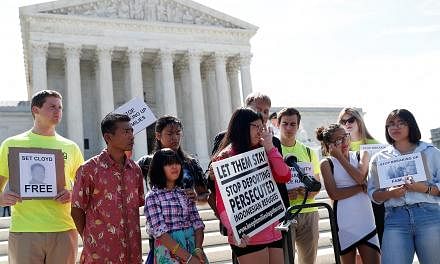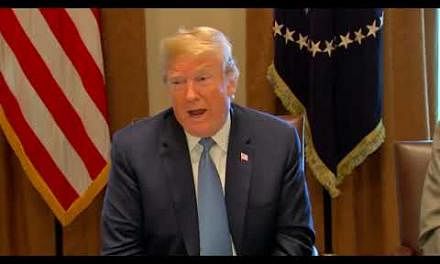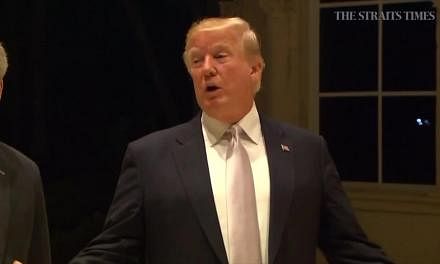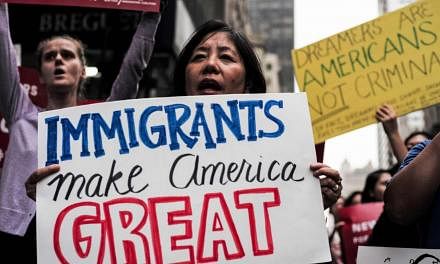SAN FRANCISCO, WASHINGTON (REUTERS, WASHINGTON POST) - The state of Washington will go to federal court to challenge US President Donald Trump's executive order banning immigration from some Muslim-majority states, Attorney General Bob Ferguson said on Monday.
Washington will be the first state to take on the executive order. Technology companies Amazon.com Inc and Expedia Inc will support the suit, Ferguson told reporters on a conference call.
Meanwhile, Democrats will seek to quickly pass legislation on Monday night to rescind Trump's travel ban from certain countries - a likely futile attempt they're poised to use to justify prolonging consideration of several top Cabinet nominees.
Senate Minority Leader Charles Schumer said on Monday morning that he will be asking Senate Republicans to immediately consider legislation to rescind Trump's executive order signed on Friday night that caused confusion at major airports nationwide and set off a wave of global reaction - including a petition banning Trump from entering the United Kingdom and a ban on Americans entering Iran.
Criticising Trump's order on Monday morning, Schumer told NBC's Today show: "It was done in such a sloppy and careless way...It almost seems like back of the envelope." Asked what Democrats planned to do in response, Schumer said he would call later on Monday for the immediate consideration of a bill by senator Dianne Feinstein to rescind the order.

But that request is likely to be fruitless, given that Republicans would object to immediately consider such a measure and because there doesn't appear to be sufficient GOP support to outright reverse Trump's ban.
While a handful of Republican senators have expressed concerns, just seven - John McCain, Jeff Flake, Lindsey Graham, Ben Sasse, Susan Collins, Cory Gardner and Dean Heller - have said they're opposed to the ban. If those five Republicans joined the chamber's 48 Democrats in supporting the bill, that's still not enough to clear various procedural hurdles that require 60 votes to overcome.
Even if Democrats fail to make their point on the Senate floor, they hope to galvanise growing public concern by holding a rally outside the US Supreme Court on Monday night. Schumer and House Minority Leader Nancy Pelosi have organised a rally for 6pm (7am Singapore time on Tuesday), an event that aides say was hatched over the weekend in a series of conversations between House and Senate aides and some lawmakers.
Stephen Miller, a top domestic policy adviser to Trump, defended the administration's travel ban on Monday, describing it as "efficient, orderly, enormously successful".
"In a world in which hundreds of millions of people would like to make America their home, it only makes sense that we engage in some kind of selection process that prioritises the entry of people who, as the order stated, don't hold bigotry, hatred or violence against any sexual orientation, against any race or against any particular class of people," Miller told CBS This Morning.
Asked about growing public concern with the policy change, Miller said: "Anytime you do anything hugely successful that challenges a failed orthodoxy you're going to see protests."
Feinstein, the top Democrat on the Senate Judiciary Committee, unveiled her bill Sunday night. Several other Democratic senators, including Christopher Murphy said they're working on legislation to address Trump's measure, which prevents people from seven majority-Muslim countries from entering the United States for 90 days without a waiver.
"The president should not be able to take this type of action unilaterally, given the severity of the consequences," Feinstein said in a statement announcing her legislation. "It's one thing to screen people before they come to this country. We already do that. It's quite another to say that individuals who are from a particular country, belong to a particular faith, or are refugees fleeing conflict are banned from the United States."
Schumer said he would also seek to delay a scheduled vote to confirm Rex Tillerson as Trump's secretary of state. He told NBC that senators deserve to hear Tillerson's views on the travel ban before holding a vote. The Senate is set to hold a procedural vote on the confirmation on Monday night before holding a final up-or-down vote on Tuesday.
US State Department officials on Monday also circulated a draft memo dissenting from Trump's executive order on immigration, and US embassies reported on foreign anger about the policy.
Chaos broke out as border, customs and immigration officials struggled to act on the directive amid loud protests at major US airports.
"The end result of this ban will not be a drop in terror attacks in the United States; rather it will be a drop in international goodwill towards Americans and a threat towards our economy," said the memo drafted under the State Department's "dissent channel", which lets officials disagree with policy.
The department is aware of the memo and values the dissent channel process, which "allows State employees to express divergent policy views candidly and privately to senior leadership," acting spokesman Mark Toner said in a statement.
Separately, US officials said the department received multiple cables from US embassies over the weekend reporting foreign dismay at the order. Host countries have expressed unhappiness, and US embassies have questioned how to implement what homeland security and other officials said was a poorly conceived policy.
A cable from the US embassy in Jakarta, Indonesia, the country with the world's largest Muslim population, reported that the order "sparked an angry reaction from the editorial pages of all major Indonesian print outlets," said a US official, reading from the cable.
Indonesians had taken to social media to express their "outrage", and cited the order as "an example of the Islamophobia of the new administration," the same official said, again reading from the cable.
Asked about the cables, a State Department spokesperson said it remained in contact with its embassies abroad but added: "We will not comment on internal communications."







